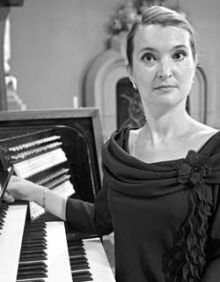The voice of the pipe organ reaches out to us from the depths of time. This instrument first appeared in Europe in the 7th century: together with a choir, it accompanied the divine service in Catholic churches and assumed its contemporary shape in the 17th century. In Ukraine the organ is mostly used as a concert instrument and is heard during church services only in western Ukraine. Organ music festivals and competitions are held both in the West and in the post-Soviet space, including Ukraine.
A recital by organist Iryna Kharechko also featured the pianist Tetiana Voitekh and the cellist Ivan Kucher. The soiree opened with Johann Sebastian Bach’s Sonata No.1 played as a duet by Voitekh and Kucher. Kharechko played solo, performing another Bach piece — Toccata and Fugue in D Minor. The concert hall was filled with the powerful breath of the organ’s polyphonic sound: this instrument can easily replace a whole orchestra. The melody resembles the pealing of church bells and is the organ’s signature tune as well as a world-famous masterpiece.
Kharechko also performed Pastorale, another work by the great German composer. The recital also included duets featuring the organ and other instruments. Kharechko and Kucher played the heartfelt Adagio with Variations by the late 19th-early 20th-century Italian composer Ottorino Respighi. The audience was thrilled by a duet performed by Kharechko and Voitekh. They played a recent version of Nocturne and The Wedding March by Felix Mendelssohn (to William Shakespeare’s Midsummer Night’s Dream).
It is unfortunate that organ and piano duets are rarely heard in Kyiv’s concert halls. At the recent recital the rearranged famous work of the German composer sounded more than exotic, because numerous works for the organ were composed in the 19th century, when the art of piano was at its finest. Composers rediscovered organ music only in the late 19th century and early part of the 20th century, a period marked by universal fascination with antiquity. At the same time, a number of works by romantic composers were set to piano and harmonium (portable organ).
The organist ended the soiree with Franz Liszt’s Fantasy and Fugue based on a theme from the opera Le Prophete by Giacomo Meyerbeer. The Protestant chorale “Ad nos, ad salutarem undam,” a conceptually grand and technically complex piece, in whose crescendo one can hear the characteristic sounds of an organ. It was interesting to watch the audience filled, surprisingly enough, with quite a few young people. Organ music has a hypnotic effect on the listener, requires a special perception, and creates an indelible impression. The sounds of an organ are not just music — they are a philosophy of sounds that makes us believe in the power and infinite nature of the universe.
The Kharechko recital was a historical excursion into the world of organ music — from the age of Classicism to the 20th century. Kharechko’s playing is on a high professional level and shows artistry and a subtle feeling for the style of the particular musical era from which a particular work for organ derives. The organist performs solo, with ensembles, and as an accompanist, particularly the well-known Ukrainian soprano Olha Basystiuk, the mezzo-soprano Natalia Lavrenova, the Kyiv Brass Ensemble, and others. In Kharechko’s view, there are favorable conditions for experimenting at the National House of Organ and Chamber Music, whose hall has excellent acoustics and a well maintained three-hand organ.
The Day ’s Fact File
Iryna Kharechko, the winner of a chamber group competition in St. Petersburg (Russia), graduated from the Kyiv Conservatory, majoring in organ and piano performance. She is constantly improving her performance skills, attending master classes taught by such well-known European musicians as F. Klinda (the Czech Republic), J. Trumer (Austria), B. Billiter (Switzerland), and H. Krummacher and H. Maetsbehr (Germany).
In 1996 she was awarded the European diploma of an organ soloist, which she did under the guidance of Professor Dorothy de Roy (the Netherlands). Kharechko has participated in organ music festivals in Krakow (Poland) and Sumy and Yalta (Ukraine). This young Ukrainian musician has toured in Germany, Poland, Austria, the Netherlands, Belgium, Russia, and many cities in Ukraine. She recently completed a tour of the Central Asian countries, together with the Kyiv Symphony Orchestra and Choir (conducted and managed by Roger McMerrin).







